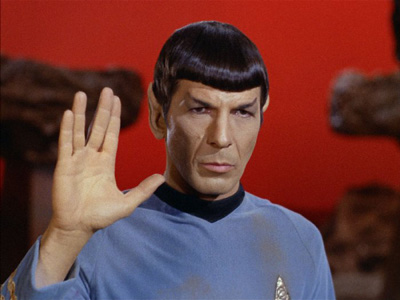8 Jewish things Leonard Nimoy gave us
Permanent link All Posts
Leonard Nimoy died in February, but the memorials continue. Nimoy embraced and celebrated his Jewish heritage publically, especially in his later years. Here are some of his most Jewish contributions to popular culture:
The Vulcan greeting was developed by Nimoy for his iconic role as Mr. Spock on the seminal Star Trek series. He based it on the gesture used by kohanim to bless Jewish congregations. It represents the Hebrew letter shin.
Shekhina
This is Nimoy’s first book of art
photographs. The subjects are Jewish women interacting with Jewish objects such
as a tallit, tefillin and mikvah. Some would find it controversial
to see women wearing these items, let alone that they are wearing little else.
American Jewish Music
This was a 13-episode, nationally broadcast radio series
Nimoy narrated. It was produced by the Milken Archive, a library of Jewish
musical recordings, many rare or unique. The
series, initially produced with WFMT, included works by Kurt Weill and Leonard
Bernstein, film scores, operas, cantorials, klezmer melodies, symphonies based
on Jewish themes, Sephardi music, and songs from Yiddish theater.
Portrayals of Jews
heroes
Nimoy read the words of one of
the greatest Torah commentators in the documentary Rashi: A Light After the Dark
Ages. He
played Samuel the Prophet in a TV movie about King David.
He played Mel Mermelstein, a Holocaust survivor who took Holocaust deniers to
court and won in Never Forget. He read the words of Israel’s
third leader, Levi Eshkol, in a documentary about Israel’s prime ministers. And
he even played Morris Meyerson, aka Mr. Golda Meir, in A Woman Called Golda,
opposite Ingrid Bergman.
Narrations of Jewish documentaries
Nimoy was a go-to voice-over
actor and interview subject for Jewish topics, including American Hasidism, American synagogues, Chinese congregations and even “Hava Negila.”
Inquisitiveness
Nimoy hosted the 1977-1982 show In Search Of…, which later inspired the
History Channel’s less-than-historical focus. The show delved into such topics
as aliens, ghosts and Bigfoot.
Loyalty
Nimoy’s co-stars and directors were
often Jewish. On Star Trek, there
were William “Kirk” Shatner and Walter “Chekov” Koenig. Fringe was
created by J.J. Abrams, who later directed the Star Trek reboot films. The Transformers movies (for which Nimoy
voiced different robots) were directed by Michael Bay. He appeared with Don Adams in the Mel Brooks show Get Smart, and on the Western show Bonanza with Lorne Greene and Michael
Landon. He directed Steve Guttenberg in Three Men and a Baby. And Nimoy was a friend of Suzanna Hoffs’
family, which is how he ended up in a video for her ’80s band, The Bangles. Nimoy
even took over as star of Mission: Impossible for Martin Landau… the man who was originally offered
the role of Spock!
A sense of humor
In a Simpsons episode, Krusty the Klown— born Herschel
Shmoikel Pinchas Yerucham Krustofski— almost leaps to his death from a speeding
monorail. Leonard Nimoy (or, more accurately, his cartoon self) grabs Krusty
and pulls him to safety, declaring: “No! The world needs laughter!”
Nimoy’s non-cartoon self agreed, roasting William Shatner and being interviewed
by one of the Muppets’ Pigs in Space, Dr.
Strangepork. He also spoofed his Spock character on Futurama and The Big Bang Theory. Most recently, he starred in a rather self-effacing video to
Bruno Mars’ “The Lazy Song.”
Along with Barbara Streisand, Mel Brooks, Joan Rivers, Jackie Mason, Neil Diamond, Woody Allen, and a precious few others of his generation, Leonard Nimoy was one of the most proudly open and openly proud Jews in entertainment.
As they say in Vulcan, “kol hakavod!”



.jpg)



